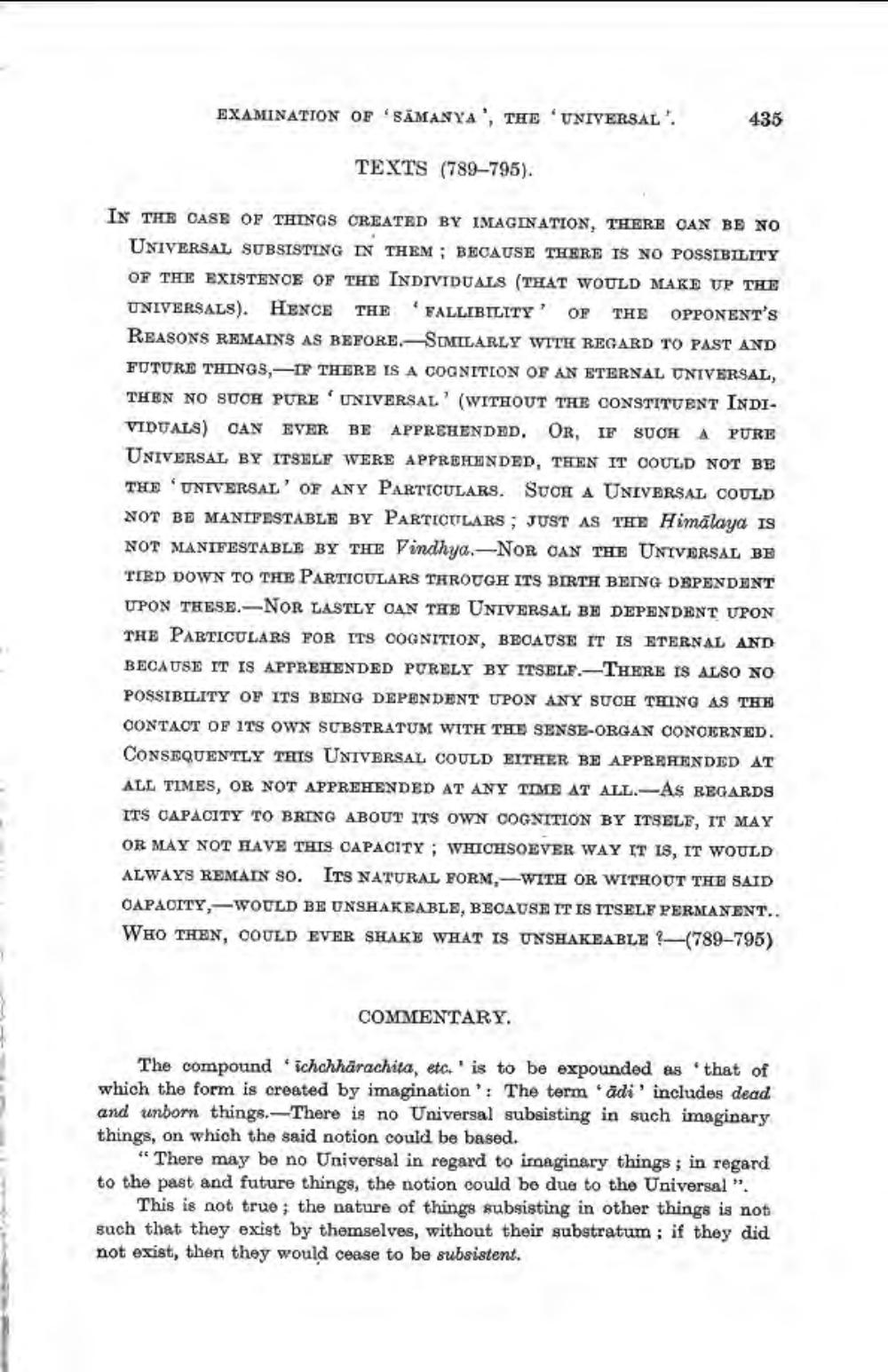________________
EXAMINATION OF SÄMANYA', THE UNIVERSAL
435
TEXTS (789-795).
IN THE CASE OF THINGS CREATED BY IMAGINATION, THERE CAN BE NO
UNIVERSAL SUBSISTING IN THEM; BECAUSE THERE IS NO POSSIBILITY OF THE EXISTENCE OF THE INDIVIDUALS (THAT WOULD MAKE UP THE UNIVERSALS). HENCE THE 'FALLIBILITY OF THE OPPONENT'S REASONS REMAINS AS BEFORE. SIMILARLY WITH REGARD TO PAST AND FUTURE THINGS,—IF THERE IS A COGNITION OF AN ETERNAL UNIVERSAL, THEN NO SUCH PURE UNIVERSAL' (WITHOUT THE CONSTITUENT INDI. VIDUALS) CAN EVER BE APPREHENDED. Or, IF SUCH A PURE UNIVERSAL BY ITSELF WERE APPREHENDED, THEN IT COULD NOT BE THE UNIVERSAL' OF ANY PARTICULARS. SUCH A UNIVERSAL COULD NOT BE MANIFESTABLE BY PARTICULARS; JUST AS THE Himalaya Is NOT MANIFESTABLE BY THE Vindhya.-NOR CAN THE UNIVERSAL BE TIED DOWN TO THE PARTICULARS THROUGH ITS BIRTH BEING DBPENDENT UPON THESE.-NOR LASTLY CAN THE UNIVERSAL BE DEPENDENT UPON THE PARTICULARS FOR ITS COGNITION, BECAUSE IT IS ETERNAL AND BECAUSE IT IS APPREHENDED PURELY BY ITSELF.THERE IS ALSO NO POSSIBILITY OF ITS BEING DEPENDENT UPON ANY SUCH THING AS THE CONTAOT OF ITS OWN SUBSTRATUM WITH THE SENSE-ORGAN CONCERNED. CONSEQUENTLY THIS UNIVERSAL COULD EITHER BE APPREHENDED AT ALL TIMES, OR NOT APPREHENDED AT ANY TIME AT ALL.-AS BEGARDS ITS CAPACITY TO BRING ABOUT ITS OWN COGNITION BY ITSELF, IT MAY OR MAY NOT HAVE THIS CAPACITY ; WHICHSOEVER WAY IT IS, IT WOULD ALWAYS REMAIN SO. ITS NATURAL FORM, WITH OR WITHOUT THE SAID CAPACITY,-WOULD BE UNSHAKEABLE, BECAUSE IT IS ITSELF PERMANENT.. WHO THEN, COULD EVER SHAKE WHAT IS UNSHAKEABLE (789-795)
COMMENTARY
The compound ichchhārachita, etc.' is to be expounded as that of which the form is created by imagination: The term 'adi' includes dead. and unborn things.--There is no Universal subsisting in such imaginary things, on which the said notion could be based.
"There may be no Universal in regard to iroaginary things; in regard to the past and future things, the notion could be due to the Universal”.
This is not true; the nature of things subsisting in other things is not such that they exist by themselves, without their substratum : if they did not exist, then they would cease to be subsistent.




